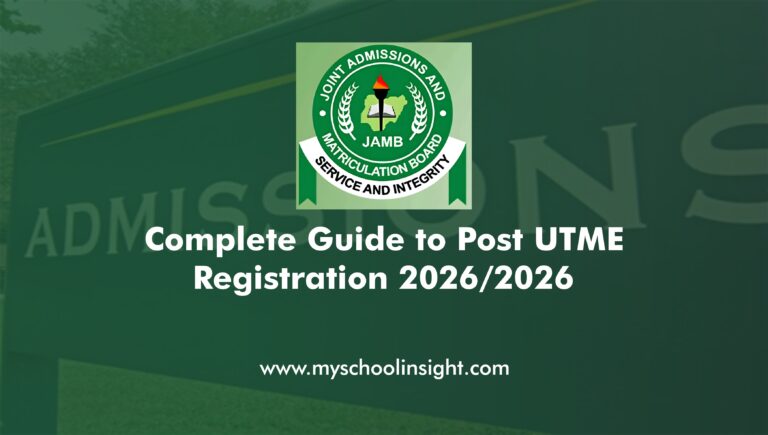Requirements for Direct Entry Admissions in Nigerian Universities

Direct Entry (DE) as an Admission process in Nigerian universities is an alternative pathway most often taken by students who already have an advanced degree in education like OND, NCE, IJMB, JUPEB or HND. With the direct entry system, successful candidates will take admission directly into the 200 Level unlike the traditional UTME system whereby candidates have to start at the 100 Level.
This in-depth guide will take a look at all you require to know in respect of the Direct Entry Admission Requirements of the academic session 2025/2026. Regardless of whether you want to apply to a federal university, state university, or a privately owned university in Nigeria, all important eligibility requirements are presented in this post, along with the qualifications that you have to meet, the steps of admission, the documents that you have to provide, the deadlines, and the cherry on top, the steps that you should take in order to successfully gain admission to one of the universities in Nigeria.
What is Direct Entry (DE) Admission in Nigeria?
Direct Entry admission system The Joint Admissions and Matriculation Board (JAMB) established the Direct Entry admission system, which acclimated candidates with previous post secondary school education to enter into universities in Nigeria without writing the Unified Tertiary Matriculation Examination (UTME).
For DE candidates, they can kick start the academic life at the position of 200 Level as long as s/he has satisfied the set academic requirements. This is the best path to take by people who have joined polytechnics, colleges of education, and A level courses but still want to get university degrees.
Advantages of Direct Entry Admission
Here are some notable advantages of DE admission:
- Time-Saving: Candidates skip 100 Level and begin from 200 Level.
- Better Academic Foundation: DE students often perform well due to prior experience.
- Cost-Effective: It reduces the cost and duration of obtaining a full university degree.
- Flexibility: It offers another admission opportunity to those who missed UTME.
- Broader Access: Accepted by most Nigerian universities across all faculties.
Who is Eligible for Direct Entry?
To be considered for DE admission in Nigeria, candidates must possess at least five (5) O’Level credits and one of the following academic qualifications:
- National Diploma (ND/OND) with a minimum of Lower Credit
- National Certificate in Education (NCE) with at least Merit
- Higher National Diploma (HND)
- IJMB (Interim Joint Matriculation Board) result with at least 6–9 points
- JUPEB (Joint Universities Preliminary Examinations Board) certificate
- GCE A-Level (Advanced Level)
- Cambridge A-Level passes in relevant subjects
- First-degree holders seeking admission into a different course/field
Basic Requirements for Direct Entry Admissions (2025/2026)
Here are the general conditions that every candidate must satisfy:
1. O’Level Requirements
Candidates must possess:
- At least five (5) credit passes in subjects relevant to their chosen course.
- These must include English Language and Mathematics.
- You may combine two sittings (WAEC/NECO/NABTEB).
2. A’Level/Equivalent Results
The following results are acceptable:
- OND/HND: Minimum of Lower Credit
- NCE: Minimum of Merit
- IJMB/JUPEB: Minimum of 6–9 points
- A-Level (GCE or Cambridge): At least two passes in relevant subjects
Note: Candidates must apply for courses that are closely related to their previous academic qualifications.
Acceptable Direct Entry Qualifications in Nigeria
Below is a breakdown of acceptable qualifications and their minimum requirements:
| Qualification | Minimum Grade | Admission Year | Duration Before University Entry |
|---|---|---|---|
| OND (ND) | Lower Credit | After ND | 2 years |
| NCE | Merit | After NCE | 2–3 years |
| HND | Pass | After HND | 2–3 years |
| IJMB | 6–15 Points | After Program | 1 year |
| JUPEB | 6–15 Points | After Program | 1 year |
| GCE A-Level | 2 Passes | After A-Level | 1–2 years |
How to Apply for Direct Entry Admission (2025/2026)
Step 1: Create a JAMB Profile
Start by visiting the JAMB e-facility portal to create a personal profile using your email and mobile number.
Step 2: Obtain the JAMB Direct Entry Form
- Purchase the Direct Entry E-PIN from any JAMB-approved bank or online payment platform.
- The form is expected to cost around ₦3,500, while the reading text and other charges may total ₦4,700.
Step 3: Visit JAMB CBT Centre
Go to an accredited CBT center for biometric data capture and registration. You’ll be asked to:
- Upload your O’Level and A’Level results
- Present all original documents
- Take passport photographs
- Verify and submit your details
Step 4: Register for Your Chosen University’s DE Screening
Most universities conduct their own DE screening process. This may include:
- Online registration
- Document verification
- Screening exam or oral interview
Ensure you visit the university’s official portal to apply and pay the screening fee (usually between ₦2,000–₦3,000).
Required Documents for Direct Entry Application
Candidates must have the following documents:
- JAMB DE registration slip
- O’Level result (WAEC/NECO/NABTEB)
- A’Level/OND/NCE/IJMB/JUPEB result or certificate
- Academic transcripts (for OND/HND candidates)
- JAMB previous result (if applicable)
- Birth certificate/declaration of age
- Certificate of origin (LGA)
- Recent passport photographs
- Marriage certificate (for name change, if any)
Top Nigerian Universities Accepting Direct Entry (2025)
Here is a list of popular Nigerian universities that accept DE admissions:
Federal Universities:
- University of Lagos (UNILAG)
- University of Nigeria, Nsukka (UNN)
- Ahmadu Bello University (ABU Zaria)
- University of Benin (UNIBEN)
- Obafemi Awolowo University (OAU)
- University of Ibadan (UI)
- Federal University of Technology Akure (FUTA)
- Federal University of Technology Owerri (FUTO)
- Bayero University Kano (BUK)
State Universities:
- Lagos State University (LASU)
- Ekiti State University (EKSU)
- Rivers State University (RSU)
- Delta State University (DELSU)
- Benue State University (BSU)
Private Universities:
- Covenant University
- Babcock University
- Afe Babalola University
- Bowen University
- Igbinedion University
Note: Not all private universities accept DE. Always verify with the admission office.
Common Direct Entry Admission Requirements by Popular Courses
Medicine and Surgery
- Accepts JUPEB and A-Level only
- Requires at least 13–15 points
- OND/NCE not usually accepted
Engineering
- Accepts OND with Lower Credit in Engineering
- Accepts IJMB/JUPEB with 9–12 points
Law
- Accepts A-Level, JUPEB, and NCE
- Requires 12–15 points
Accounting
- Accepts OND, HND, NCE, JUPEB, IJMB
Education
- NCE holders are preferred
- Subject relevance is key
Key Deadlines for 2025/2026 DE Admission
Although exact dates vary each year, here’s a general timeline:
| Activity | Expected Period |
|---|---|
| JAMB DE Form Sale | February – May 2025 |
| CBT Center Registration | February – June 2025 |
| University Screening | May – September 2025 |
| Admission Lists | July – October 2025 |
Always check JAMB and your university’s portal for real-time updates.
Common Mistakes to Avoid
- Submitting incomplete or incorrect documents
- Applying for a course unrelated to your qualification
- Waiting too long before applying
- Ignoring university-specific guidelines
- Not uploading your result to JAMB CAPS
How to Check Your Direct Entry Admission Status
After registration, candidates must:
- Log in to JAMB CAPS Portal
- Select “Check Admission Status”
- Choose “Access my CAPS”
- Click on “Admission Status”
Once offered admission, click “Accept” or “Reject” promptly.
Pro Tips for a Successful DE Application
- Choose universities that are DE-friendly.
- Ensure your documents are scanned clearly for upload.
- Monitor JAMB CAPS regularly for admission updates.
- Apply for courses that match your previous discipline.
- Prepare for possible university screening or oral interview.
Conclusion
Direct Entry option in the Nigerian universities is one of the best ways to enable students who have advanced qualifications into fulltime degree programs. As an OND, HND, NCE, JUPEB, or IJMB holder, this knowledge of the requirements and the timelines will place you in a better position in the 2025/2026 academic session as far as meeting the requirements and the timelines is concerned to have your admission.
Keep in touch with JAMB and the institution of your choice hence be on top of the announcement, and have your credentials ready. By adequate preparation, your 200 Level journey into a good Nigerian university can start immediately.






One Comment